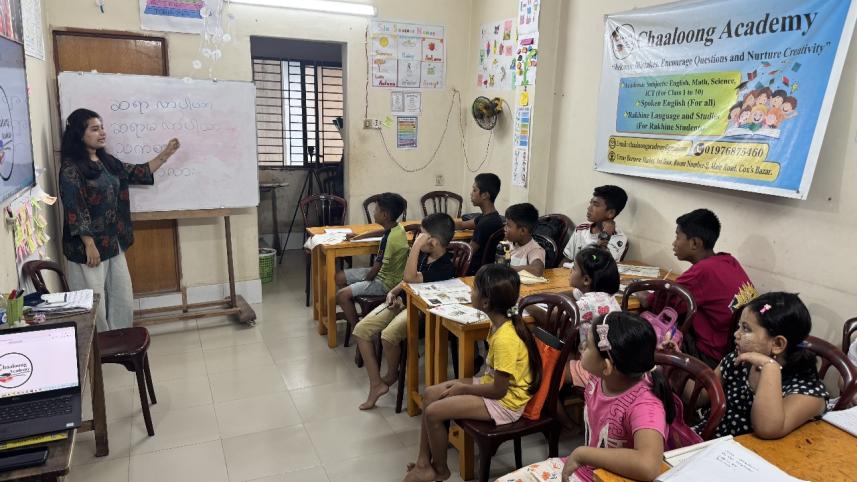Teaching roots one letter at a time

Inside a small classroom in Cox's Bazar's Burmese Market area, a group of 12 to 15 Rakhine children sit together, learning in a setting unlike regular schools.
Their teacher, Nila Wan, guides them through the Rakhine alphabet, helping them read and write in their own language.
The language programme is not part of their official curriculum and carries no marks in examinations, yet the children attend eagerly, seeking identity through their mother tongue.
After completing her Bachelor's degree at Chittagong University and a Master's in Education at the Asian University for Women, Nila launched "Chaaloong Academy" in May last year.
In Rakhine, Chaaloong means "meaningful word".
"Many from our generation could read and write in Rakhine. But in the new generation, that number has decreased significantly," Nila told The Daily Star.
"These children can still speak the language at home, but they are not familiar with the alphabet. They cannot read or write. Books about Rakhine history and traditions remain out of their reach. That is why I began this initiative.
"If a tree has no roots, can it survive? No. One must first know their roots, their people, and work for them. That sense of responsibility drove me."
Although the academy offers English and Mathematics, promoting the Rakhine language has become its main goal. The programme, designed for Rakhine children, is held only on Fridays and Saturdays. It began with 50 students but now runs several batches of around 40 each.
"Many in our community support me. Parents want their children to know their language and culture. They couldn't take such initiatives in their time, so they are more enthusiastic now," Nila said.
However, not all parents agree. Some believe reading and writing in Rakhine will not help their children in exams.
Textbooks were also a challenge. "At first, it was very hard to find books. Later, we managed to bring them from Myanmar," she said.
One of her students, Ja Then U, said, "Earlier, we could not read or write in Rakhine. After this academy started, now we can. I feel very happy that I can finally read books written in my own language."
"Just as Bangla is important for our country, I want our Rakhine language to be valued in the same way," Nila said.
Currently, classes are run almost free of cost, but financial constraints remain. "We want to create a platform where children can study for free. They should get quality education without barriers. Nothing should stand in the way of their learning," Nila said.




 For all latest news, follow The Daily Star's Google News channel.
For all latest news, follow The Daily Star's Google News channel.
Comments